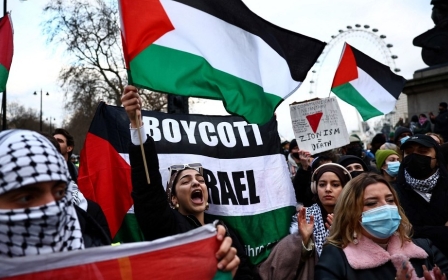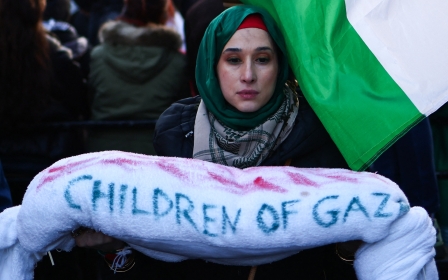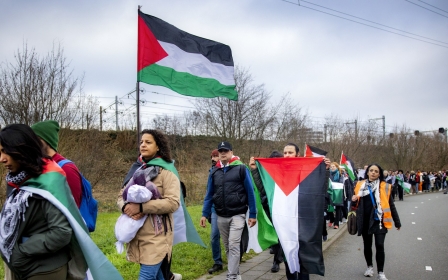UK antisemitism monitor inside police operations room during Gaza war protests

The UK’s antisemitism monitor, the Community Security Trust (CST), has been inside the Metropolitan Police’s special operations room during London protests calling for a ceasefire in Gaza, Middle East Eye can reveal.
The presence of the CST during the monitoring of the pro-Palestine demonstrations is likely to raise further complaints about political influence on the policing of the protests ahead of another mass march set to take place this Saturday as part of a “Global Day of Action for Gaza”.
The CST works closely with the UK government and the police and has echoed criticism of protesters by government ministers who have previously urged police to ban the demonstrations and accused protesters of stoking antisemitism - an accusation that organisers have strenuously denied.
In a statement ahead of a march in London on 11 November, it said the regular demonstrations were “disrupting the peace and the basic rights of Jews” and called for them to end.
The CST has also welcomed arrests made by police for suspected terrorism and public order offences in connection with the protests and said after the November demonstration that it had identified multiple suspects and passed on information to counter-terrorism police.
New MEE newsletter: Jerusalem Dispatch
Sign up to get the latest insights and analysis on Israel-Palestine, alongside Turkey Unpacked and other MEE newsletters
In a statement earlier this month, the Metropolitan Police said it had made more than 400 arrests in relation to offences linked to the war in Gaza, which has raged since Hamas's attacks into southern Israel on 7 October.
It said it had launched around 30 counter-terrorism-led investigations into suspected offences at protests in London and had set up “a dedicated taskforce... to identify terrorism offences linked to protests”.
Asked about the presence of the CST in its special operations room during the demonstrations, a Metropolitan Police spokesperson said it had invited “a wide range of individuals and community leaders… to observe how public order events are managed”.
The spokesperson said: “Individuals invited to attend are observers from a range of communities and organisations and do not make or influence operational decisions.
“The Met's Command Team is operationally independent and makes all operational decisions impartially. The Met has engaged widely with both Jewish and Muslim communities across London in relation to recent events.”
Asked which representatives from Muslim communities had been invited into the special operations room, the spokesperson said: “We’re not getting into specific names or groups.”
Organisers of the regular marches confirmed to MEE that they had not been invited to the special operations room despite holding meetings with police before each demonstration to discuss the logistics of the protests.
Organisers say the marches have been peaceful and inclusive events attended by hundreds of thousands of people, and point to the presence among attendees of a large Jewish bloc and speakers from Jewish organisations which support calls for a ceasefire and Palestinian rights.
MEE understands that organisers have raised concerns about the CST in complaints sent to the police.
'Political pressure'
Giving evidence to parliament’s Home Affairs Select Committee in December, Ben Jamal of the Palestine Solidarity Campaign, part of a coalition of organisations coordinating the protests, said organisers were becoming “increasingly concerned” about political pressure being exerted on the police.
“We think the police are responding to political pressure that seeks to demonise these protests,” Jamal said.
Chris Nineham, the vice-chair of the Stop the War coalition and the chief steward on the Gaza ceasefire demonstrations, told the committee that organisers had been put under pressure by police to cancel the 11 November march and had faced “an unprecedented use of section 12 orders”, a public order power used to impose restrictions and conditions on protests.
“I think the police have been under a lot of pressure from a Government that is very hostile to our cause, very hostile to the cause of peace and very hostile to the cause of the Palestinians,” Nineham said.
MEE understands that leading members of the Jewish community have also raised concerns with senior police officers about the politicisation of policing operations surrounding the protests.
A spokesperson for Na'amod, a movement of British Jews which seeks to end the British Jewish community's support for the Israeli occupation of the West Bank, East Jerusalem and the Gaza Strip, and which has supported the protests, told MEE: "If these reports are accurate, the CST’s presence in the special operations room during the protests would seem highly inappropriate, particularly considering the organisation’s vocal opposition to the protests."
The CST had not responded to MEE's request for comment at the time of publication.
Addressing the Home Affairs Select Committee session in December, Dave Rich, who heads policy at the CST, told MPs that the organisation had been in “constant discussions with the police and CPS [Crown Prosecution Service]… about the policing of these marches”.
Rich added that the CST had a long-standing relationship with the Met’s hate crime units and counter-terrorism police in London and around the country.
“Those relationships exist for us to report in real-time,” Rich told the committee.
In the aftermath of October’s Hamas attacks, the UK government said it would provide an extra $3.8m (£3m) in funding to the CST to fund extra protection for Jewish schools, synagogues and community buildings, bringing its total funding for 2023-24 $22.9m (£18m).
Mark Gardner, the CST’s chief executive, also attended an “Israel Policing Roundtable” with Prime Minister Rishi Sunak, other ministers and senior police officers at Downing Street.
Concerns about the presence of the CST in the operations room come after a number of human rights organisations last month wrote to Metropolitan Police commissioner Mark Rowley to complain that Home Office special advisors had also been given "unprecedented access" to the room.
Middle East Eye delivers independent and unrivalled coverage and analysis of the Middle East, North Africa and beyond. To learn more about republishing this content and the associated fees, please fill out this form. More about MEE can be found here.





